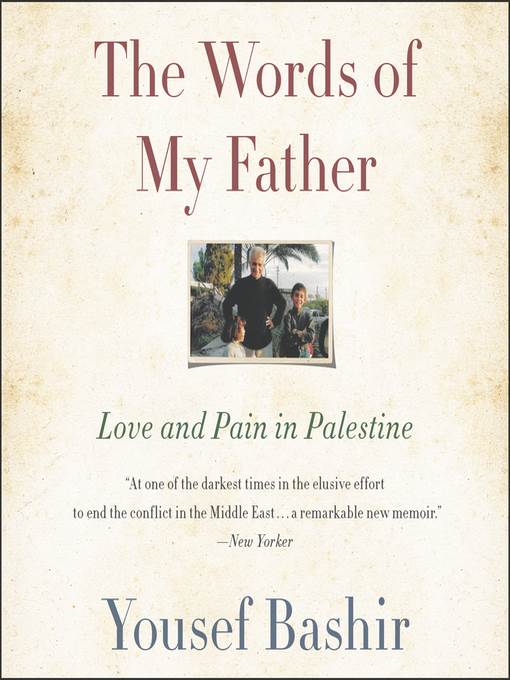
The Words of My Father
Love and Pain in Palestine
کتاب های مرتبط
- اطلاعات
- نقد و بررسی
- دیدگاه کاربران
نقد و بررسی

December 1, 2018
Palestinian peace activist Bashir was 11 when Israeli soldiers seized the top two floors of his family home during the Second Intifada, and he began to question his pacifist father's stance. Then he was shot in the back by an Israeli soldier. Complementing Letters to My Palestinian Neighbor; with a 50,000-copy first printing.
Copyright 2018 Library Journal, LLC Used with permission.

April 1, 2019
Bashir, a member of the Palestinian Diplomatic Delegation to the United States, recounts his childhood as a Palestinian living in Gaza. The author grew up on a farm near an Israeli military base and, during the second Intifada, Israeli soldiers occupied the family home when Bashir's father, Khalid, refused to leave. The family were treated like prisoners, endured humiliations at the hands of the soldiers, and watched as much of their property was destroyed. Despite the circumstances, Khalid treated the soldiers with respect and continued to advocate for peace, which a young Bashir did not understand. At 15, Bashir was shot in the back by an Israeli soldier and recovered at an Israeli hospital. His experience led him to understand his father's viewpoint, pursue schooling in the United States, and pushed him to advocate for Israeli and Palestinian coexistence. Bashir's childhood in Gaza and his life under occupation meld in this retelling, and his charming earnestness shines through. VERDICT This moving tribute to Bashir's remarkable father is also a compelling argument for peace. Recommended for readers interested in the conflict in the Middle East. [See Prepub Alert, 11/5/18.]--Rebekah Kati, Univ. of North Carolina, Chapel Hill
Copyright 2019 Library Journal, LLC Used with permission.

April 15, 2019
Bashir delivers an urgent, impassioned call for peace between Palestine and Israel. The words of the Palestinian peace activist's father are, on the surface, incontestable: Strive for peace, he insisted, for "violence only leads to more violence." Yet, during the second intifada and in the face of the intransigence of Israel's government in dividing the Gaza Strip from the West Bank and barring movement between the two Palestinian areas, striving for peace became a difficult proposition to hold up--and one that was particularly difficult to defend in a time of growing militance. By Bashir's account, the plot of land that his educator father had so carefully improved, building the soil, planting trees by the hundreds and crops by the row, became a dust bowl under a de facto Israeli siege. Moreover, an Israeli soldier shot him for reasons that he finds inexplicable today, paralyzing him for a long period and requiring multiple surgeries. Years later, writes the author, even as he mourns the passing of his father and the loss of the land that his father took pains to tell him was his forever, he found himself thinking obsessively of that transformational event and the Israeli soldier behind the gun. "That single shot had changed my whole life," he writes, "and I wondered if it had changed his." In the end, the story comes full circle, as Bashir travels the world to convey the message of peace in the Middle East, the bullet in his back, as he puts it, moving him forward and not restraining him. There is some bitterness nonetheless, especially when he recounts that Israeli soldiers commandeered all the cooking vessels in his family home and then left them behind, each full of feces. Even with that insult, in this eloquent and affecting memoir he adopts another remark of his father's as his own: "What happened to me makes me believe even more in peace." An inspiration to peace activists in all theaters of war and struggle and a book that deserves a wide audience.
COPYRIGHT(2019) Kirkus Reviews, ALL RIGHTS RESERVED.

June 10, 2019
Bashir’s candid and deeply felt coming-of-age story unfolds largely during the Second Intifada. Starting when Bashir was 11, Israeli soldiers occupied his family’s farm on the Gaza Strip. He led a fairly average adolescent life—playing video games and watching soccer—while witnessing abuse, such as when soldiers would force his father, a respected school headmaster who advocated for peace with Israel, to submit at gunpoint to a daily strip search. Bashir’s father remained a pacifist, even after 15-year-old Bashir was shot by an Israeli soldier from a watchtower outside his house just minutes past curfew. He was left paralyzed from the waist down for a year, and despite his anger, he recognized the complexities of his country: “It was a Jewish soldier who had shot me, but the nurses were also Jewish.” Three years later, attending college in Boston, Bashir advocated for Israeli-Palestinian peace and later became a member of the Palestinian Diplomatic Delegation to the U.S. Throughout, his father’s words resonated: “Violence only leads to more violence.” Even in the face of great adversity, Bashir prevails as an optimistic champion of peace, as he eloquently and subtly writes, “all I had to offer this world were my little words about the need for peace.” This moving meditation of a young man’s struggle to find peace amid turmoil will resonate with readers concerned with Israeli-Palestinian relations.

























دیدگاه کاربران